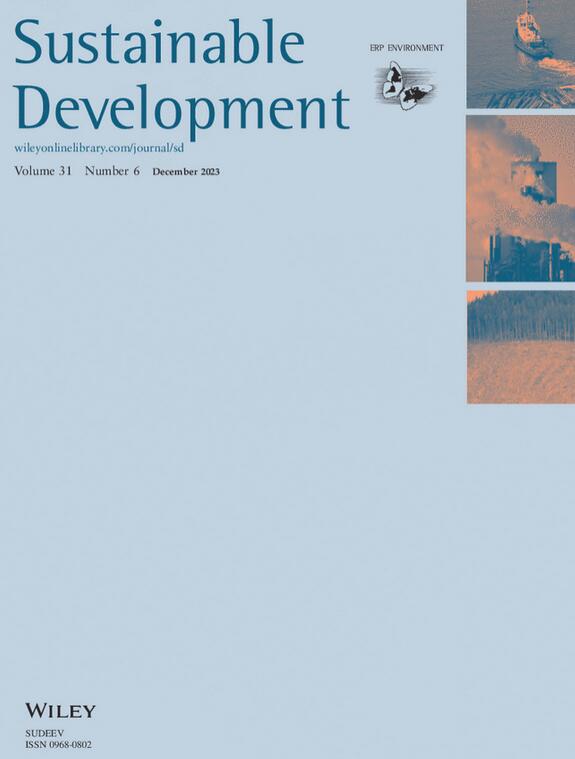Moving towards sustainable environment development in emerging economies: The role of green finance, green tech‐innovation, natural resource depletion, and forested area in assessing the load capacity factor
IF 8.2
1区 环境科学与生态学
Q1 DEVELOPMENT STUDIES
引用次数: 0
Abstract
Environmental sustainability is increasingly being prioritized by governments around the world, particularly in emerging economies. This study examined the role of green finance and green technological innovation in environmental sustainability using the “load capacity factor”, also takes into account natural resource depletion and forest cover. This study used annual data from 2000 to 2018 for emerging economies: Brazil, China, India, Indonesia, Turkey and Mexico. Methods of analysis included the cross‐section augmented autoregressive distributed lags (CS‐ARDL) model, along with validation by the common correlated mean group (CCEMG) and augmented mean group (AMG). The results show that green finance, green technological innovation and forested areas consistently have a positive impact on environmental sustainability, while resource depletion has a negative impact. The findings of CS‐ARDL are consistent with those of CCEMG and AMG. The study also makes recommendations that emerging economies need to prioritize REDD+ (Reducing Emissions from Deforestation and Forest Degradation) initiatives and implement resource decoupling policies, in addition to green finance and green technology policies, to achieve environmental sustainability.新兴经济体迈向可持续环境发展:绿色金融、绿色技术创新、自然资源枯竭和森林面积在评估负载能力系数中的作用
世界各国政府,尤其是新兴经济体政府,越来越重视环境的可持续发展。本研究使用 "负载能力系数"(也考虑了自然资源枯竭和森林覆盖率)研究了绿色金融和绿色技术创新在环境可持续性中的作用。本研究使用了 2000 年至 2018 年新兴经济体的年度数据:巴西、中国、印度、印度尼西亚、土耳其和墨西哥。分析方法包括横截面增强自回归分布滞后(CS-ARDL)模型,以及共同相关均值组(CCEMG)和增强均值组(AMG)验证。结果表明,绿色金融、绿色技术创新和森林面积对环境可持续性一直有积极影响,而资源枯竭则有消极影响。CS-ARDL 的研究结果与 CCEMG 和 AMG 的研究结果一致。研究还提出建议,新兴经济体要实现环境可持续性,除了绿色金融和绿色技术政策外,还需要优先考虑 REDD+(降低因森林砍伐和退化所产生的排放)倡议,并实施资源脱钩政策。
本文章由计算机程序翻译,如有差异,请以英文原文为准。
求助全文
约1分钟内获得全文
求助全文
来源期刊

Sustainable Development
Multiple-
CiteScore
17.30
自引率
11.20%
发文量
168
期刊介绍:
Sustainable Development is a publication that takes an interdisciplinary approach to explore and propose strategies for achieving sustainable development. Our aim is to discuss and address the challenges associated with sustainable development and the Sustainable Development Goals. All submissions are subjected to a thorough review process to ensure that our readers receive valuable and original content of the highest caliber.
 求助内容:
求助内容: 应助结果提醒方式:
应助结果提醒方式:


